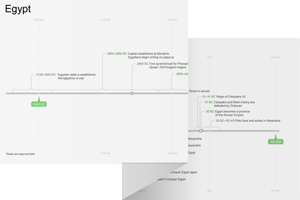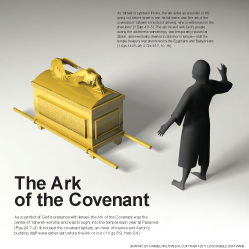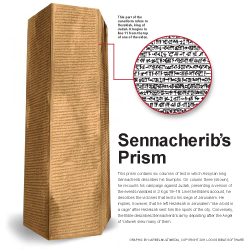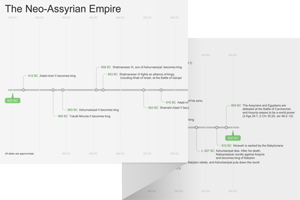37:1–13 Verses 1–38 is paralleled in 2 Kgs 19:1–37. Hezekiah seeks Isaiah’s counsel (Isa 37:1–7), and then receives an intimidating letter from an Assyrian official, echoing the threats of his speeches from ch. 36 (vv. 8–13). |
37:1 covered himself with sackcloth Outward signs of grief, distress, and humility.
entered the temple of Yahweh Refers to the temple in Jerusalem. Unlike Ahaz, who defiantly refused to ask Yahweh for a sign (7:12), Hezekiah humbly seeks His counsel immediately.
37:2 Eliakim, who was in charge of the palace, and Shebna Two of the officials from the meeting with the Assyrian official (see 36:2–3).
37:3 there is no strength to give birth Hezekiah realizes that Judah has no chance of resisting Assyrian power apart from God’s help. The childbirth metaphor is similar to 13:8 and 66:7–9.
37:4 to taunt the living God Hezekiah frames the conflict not as an appeal to rescue Judah for their sake or because of an automatic defense of Zion, but as a defense of God’s own honor. Yahweh may not be drawn into the conflict due to Judah’s sinfulness, but will perhaps arise to defend His reputation (see 33:10; 37:35).
the remnant Judah has been overrun by Sennacherib’s armies who took all of Judah’s fortified cities (see 36:1). Hezekiah sees Jerusalem as the sole surviving remnant of Judah (see 1:9 and note).
37:6 You must not be afraid Isaiah reassures Hezekiah with a message of trust similar to what he told Ahaz in 7:4–5. While Ahaz responds with a lack of trust, Hezekiah shows piety.
37:7 he shall hear a rumor Possibly a rumor of unrest back home, or an allusion to the movements of an army of Egypt (v. 9). His return to his own land may indicate the rumor is about a plot to remove him from power—not uncommon among Assyrian kings (see vv. 37–38).
I will cause him to fall by the sword Sennacherib is later assassinated (see v. 38).
37:8 the king of Assyria fighting against Libnah Apparently, the Assyrian army withdrew from Jerusalem after delivering the threats to Hezekiah.
37:9 Tirhakah the king of Cush The younger brother of the pharaoh Shabaka. Egypt usually remained neutral in Assyrian conflicts in Syria-Palestine, but Judah’s tribute (see 30:6) must have inspired them to at least make a nominal attempt to assist Judah. However, the pharaoh sent an inexperienced younger brother rather than taking out his army himself—the attempted intervention was half-hearted at best.
of the pharaoh Shabaka. Egypt usually remained neutral in Assyrian conflicts in Syria-Palestine, but Judah’s tribute (see 30:6) must have inspired them to at least make a nominal attempt to assist Judah. However, the pharaoh sent an inexperienced younger brother rather than taking out his army himself—the attempted intervention was half-hearted at best.
37:10 Do not let your God in whom you trust in him deceive you Earlier, the Assyrian official had urged the people of Jerusalem to not trust Hezekiah or his appeals to trust God (see 36:14–15). Now he directly urges Hezekiah to not trust God, returning again to the example of the other nations whose gods failed to protect them (36:19–20 and 37:12).
37:12 that my predecessors destroyed Familiar rhetoric from arrogant Assyria (see 10:10–11; 36:18–20).
37:14 Hezekiah took the letter Diplomatic correspondence was common in the ancient Near East. Many archives of letters have been discovered from ancient Egypt, Mesopotamia, and Syria-Palestine.
he went up to the temple of Yahweh, and Hezekiah The king gives no immediate reply to the messengers, but sets the letter before Yahweh to ask for deliverance (see note on v. 1).
37:16 who is enthroned on the cherubim Yahweh’s presence in the temple was above the cherubim on top of the ark of the covenant (see Exod 25:22; Num 7:89; 1 Sam 4:4).
on top of the ark of the covenant (see Exod 25:22; Num 7:89; 1 Sam 4:4).
37:17 Yahweh, extend your ear Compare 2 Chr 6:40.
37:19 the work of human hands Hezekiah has reason to trust Yahweh. While the gods of the nations were unable to deliver them, Hezekiah serves the true God—not an idol made by human hands (see Isa 41:23, 29; 44:9–20).
37:20 the kingdoms of the earth may know Yahweh would prove Himself in the eyes of the nations if He delivered them when all other deities failed. The ultimate recognition of Yahweh by all the nations is a central theme of Isaiah (e.g., 2:2–4).
37:21 to Hezekiah God answers Hezekiah’s prayer by speaking through His prophet, Isaiah.
37:22 the word that Yahweh has spoken A prophecy of judgment for Sennacherib’s arrogance, similar to the downfall of Assyria predicted in 10:12–27 and 31:8–9.
37:24 you have said Assyria arrogantly boasts that their success is of their own making (see 10:8–11, 13–14).
37:26 Have you not heard from a long time ago? I have made it Assyria’s success was all part of God’s plan (see 10:5, 15; 14:24–25; 25:1–2).
fortified cities to collapse into heaps of destroyed stones See 36:1.
37:29 my hook The Assyrians used hooks on their prisoners (see 2 Chr 33:11; Ezek 19:9).
my bridle on your lips Just as a bit and bridle gives control over a horse, God can easily turn Assyria’s course. See Isa 30:28.
37:30 this shall be the sign for you God provides a sign for Hezekiah, just as He offered one to Ahaz (7:13). This sign gives hope of survival for Judah as they recover from the devastation of the Assyrian invasion.
37:34 by the way that he came See v. 7.
37:35 for my sake Hezekiah’s prayer has resulted in Jerusalem’s salvation as the remnant of Judah. But Judah will not be saved because they are Yahweh’s chosen people, or because Jerusalem is His dwelling. Yahweh will save Jerusalem for His own reputation and His covenant with David.
37:36 the angel of Yahweh Appearances of the “angel of Yahweh” in the ot often blur the distinction between Yahweh and the angel. The angel’s appearance symbolized both judgment (2 Sam 24:16) and deliverance or protection (Exod 14:19).
in the ot often blur the distinction between Yahweh and the angel. The angel’s appearance symbolized both judgment (2 Sam 24:16) and deliverance or protection (Exod 14:19).
struck one hundred and eighty-five thousand A miraculous delivery, and the fulfillment of Isa 31:8 and 10:16.
37:37 Sennacherib king of Assyria left, went The official annals of Sennacherib give no details as to why he left Judah without conquering Jerusalem. He simply says he left Hezekiah cooped up “like a bird in a cage.” See note on v. 36.
give no details as to why he left Judah without conquering Jerusalem. He simply says he left Hezekiah cooped up “like a bird in a cage.” See note on v. 36.
37:38 was bowing in worship in the house of Nisroch Sennacherib’s assassination occurred much later—in 681 bc. Omitting the time-lapse in the biblical narrative gives a greater sense of immediacy between God’s prophecy that Sennacherib would die in his own land (v. 7) and the fulfillment in v. 38.
to the land of Ararat A rugged mountain range north of Assyria.
Esar-haddon his son King of Assyria from 681–669 bc.

|
About Faithlife Study BibleFaithlife Study Bible (FSB) is your guide to the ancient world of the Old and New Testaments, with study notes and articles that draw from a wide range of academic research. FSB helps you learn how to think about interpretation methods and issues so that you can gain a deeper understanding of the text. |
| Copyright |
Copyright 2012 Logos Bible Software. |
| Support Info | fsb |
 Loading…
Loading…




